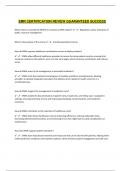EMR CERTIFICATION REVIEW GUARANTEED SUCCESS
What criteria is used by the NHSTA to evaluate an EMS system? ✔️✔️Regulation, policy, education of
public, resource management
What is the purpose of fire rescue ✔️✔️provide specialized rescues
How do EMRs improve healthcare coordination across multiple providers?
✔️✔️ EMRs allow different healthcare providers to access the same patient records, ensuring that
everyone involved in the patient's care is on the same page, which enhances coordination and reduces
errors.
How do EMRs assist in the management of comorbid conditions?
✔️✔️ EMRs track the treatment and progress of multiple conditions simultaneously, allowing
providers to develop integrated care plans that address all of a patient’s health concerns in a
coordinated way.
How do EMRs support the management of outpatient care?
✔️✔️ EMRs enable the documentation of patient visits, treatments, and follow-ups in outpatient
settings, ensuring continuity of care and improving scheduling, communication, and treatment
outcomes.
How do EMRs contribute to the reduction of healthcare costs?
✔️✔️ EMRs help reduce healthcare costs by improving efficiency, reducing redundant tests,
decreasing administrative burdens, and minimizing errors that might lead to costly complications or
readmissions.
How does EMR support patient education?
✔️✔️ EMRs store educational materials and resources that can be shared with patients, helping them
understand their conditions and treatment options, which enhances patient engagement and self-care.
, How do EMRs improve discharge planning for patients?
✔️✔️ EMRs help providers prepare discharge plans by tracking patient progress, medications, follow-
up appointments, and instructions, ensuring smooth transitions and reducing the risk of readmission.
How do EMRs assist in the management of mental health treatment?
✔️✔️ EMRs document mental health assessments, therapies, and medication histories, allowing
providers to track patient progress and tailor treatments for individuals with mental health conditions.
How do EMRs support compliance with public health reporting requirements?
✔️✔️ EMRs facilitate the collection and reporting of data for public health agencies, such as
immunization rates, disease surveillance, and population health statistics, ensuring timely and accurate
reporting.
How do EMRs enable data-driven clinical decision-making?
✔️✔️ EMRs aggregate patient data and provide decision support tools, such as evidence-based
guidelines and alerts, which assist providers in making informed, data-driven clinical decisions.
How does EMR improve patient safety in surgical procedures?
✔️✔️ EMRs track pre-operative assessments, medication lists, allergies, and surgical plans, helping
reduce the risk of errors and improving the overall safety of surgical procedures.
How do EMRs help with patient care during transitions of care?
✔️✔️ EMRs ensure that patients' medical histories, treatments, and follow-up care plans are clearly
documented and accessible, which supports smooth transitions between care settings, such as from
hospital to home or nursing care.
How do EMRs assist in tracking health trends in populations?
✔️✔️ EMRs aggregate data from large groups of patients, enabling healthcare organizations to
identify trends in disease prevalence, treatment efficacy, and outcomes, which helps guide public health
strategies.
How do EMRs improve the accuracy of patient demographic information?




